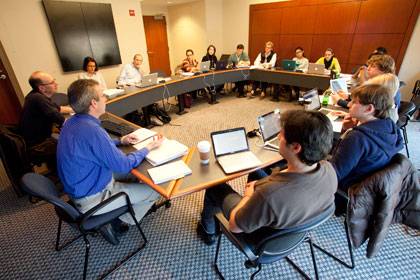New Program Encourages Professors to Learn From Each Other
Blue Devil TeachX debuts this semester, encourages faculty members to sit in on their colleagues' classes

A new Duke University program will encourage faculty members to pick up teaching pointers from their peers.
The Blue Devil TeachX program debuts later this semester. It will encourage professors to both open their classrooms to other faculty members and to sit in on their colleagues’ classes as well in the hopes of finding some new inspiration or a new teaching tool.
A ‘course catalog’ is expected to be published by mid-February with the one-week stretch of open classes to occur around the third week of March. Organizers hope to involve 100 faculty members at first, said Ed Balleisen, a Duke history professor and vice provost for interdisciplinary studies.
“People teach very differently, so this is an opportunity to go across the university to a different school or a different field,” Balleisen said. “We hope that this event makes it easier for people to reach out to a colleague”
Provost Sally Kornbluth hopes TeachX will prompt more faculty to talk with each other about their teaching.
“There are so many great teachers here at Duke who collectively practice a wide variety of teaching methods,” Kornbluth said. “I’m hoping this event will inspire a widespread sharing of those approaches, will encourage a stronger sense of community around teaching, and will build enthusiasm among both experienced and new faculty. I look forward to hearing about the stories that emerge out of the TeachX week.”
Blue Devil TeachX will be latest in a series of Duke initiatives aimed at improving teaching. It is intended to be a broad-but-not-deep examination of a faculty peer’s teaching techniques, Balleisen said. Other programs, such as a peer mentorship program run by Bass Fellows that pairs professors for an extended period of time, and the Center for Instructional Technology’s “Visit a Classroom” program, offer a more immersive exploration.
Balleisen’s interest in this new program stems in part from an experience he had more than decade ago while sitting in on a class at the Harvard Business School. The two-hour course was “an intense give-and-take,” Balleisen recalled, highly structured and interactive. It was a change from the sort of teaching Balleisen was accustomed to.
“I found it really invigorating and it really led me to experiment in my teaching of Duke undergraduates,” he said.
Among other things, Balleisen noted the value of classroom architecture: the Harvard classroom was semi-circular rather than a traditional lecture hall. That one modification prompted more engagement because students could see each other, Balleisen noted.
Duke’s new program, which Balleisen hopes will become an annual endeavor, might prompt changes small or large.
“People could borrow one small technique,” he said. “Or they could re-think their whole syllabus.”
Michael “Buz” Waitzkin, whose class will be listed in the TeachX course catalog, is relatively new to teaching, though not to public speaking. A long-time trial lawyer, Waitzkin was hired last year as deputy director of the Duke Initiative for Science and Society and this semester is teaching a course on science law and policy.
As a lawyer, Waitzkin often killed time in courtrooms watching fellow attorneys argue cases, hoping to discover a clever strategy or technique. At Duke, he will open his classroom for the TeachX program hoping that any professors who sit in on it offer up some constructive criticism.
“This will make you present your best game and have colleagues critique, praise and give you different perspectives,” said Waitzkin, who has taught occasional classes at Duke for about 15 years. “There’s not one way to do things, and the way I might do it isn’t the only way. I’ll be really disappointed if people who sit in my class don’t spend a few minutes to give me feedback.”